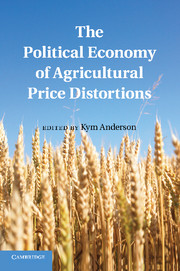Book contents
- Frontmatter
- Contents
- List of Figures
- List of Tables
- Contributors
- Foreword
- Preface
- Abbreviations and Acronyms
- PART ONE Introduction
- PART TWO CONCEPTUAL FRAMEWORKS AND HISTORICAL ORIGINS
- THREE Political Economy of Agricultural Distortions
- FOUR Special Interests versus the Public Interest in Policy Determination
- FIVE Anglo-French Trade, 1689–1899
- SIX Agricultural Protection Growth in Europe, 1870–1969
- SEVEN Determinants of United States Farm Policies
- EIGHT Agricultural Distortions in the Transition Economies of Asia and Europe
- Part Three Political Econometrics: the Past Fifty Years
- Appendix: Coverage and Distribution of Assistance across Countries and Products, 1955–2007
- Index
- References
SEVEN - Determinants of United States Farm Policies
Published online by Cambridge University Press: 05 July 2011
- Frontmatter
- Contents
- List of Figures
- List of Tables
- Contributors
- Foreword
- Preface
- Abbreviations and Acronyms
- PART ONE Introduction
- PART TWO CONCEPTUAL FRAMEWORKS AND HISTORICAL ORIGINS
- THREE Political Economy of Agricultural Distortions
- FOUR Special Interests versus the Public Interest in Policy Determination
- FIVE Anglo-French Trade, 1689–1899
- SIX Agricultural Protection Growth in Europe, 1870–1969
- SEVEN Determinants of United States Farm Policies
- EIGHT Agricultural Distortions in the Transition Economies of Asia and Europe
- Part Three Political Econometrics: the Past Fifty Years
- Appendix: Coverage and Distribution of Assistance across Countries and Products, 1955–2007
- Index
- References
Summary
This chapter focuses on the political economy of U.S. farm policy since the Uruguay Round trade negotiations concluded in 1994 and established the World Trade Organization (WTO). The significance of this point of reference is that it introduced a new element into the consideration of farm programs by setting out, in the Agreement on Agriculture (URAA), a multilateral framework for government policies in the areas of domestic support, market access, and export competition. Though few would have expected the United States to make substantial commitments with an immediate impact on its domestic programs, changes might have been anticipated over time in the formulation of U.S. farm policy as a result of its incorporation into an international treaty. Yet the broad thrust of agricultural policies in the United States since the URAA has exhibited a remarkable consistency with earlier decades. Old instruments have been adapted and new ones developed, but the policy mix serves essentially the same purposes, and benefits the same groups, as in the mid-1980s. This resilience of U.S. policy in the context of a potentially increasingly assertive set of multilateral trade rules is a core theme of the chapter.
As an exporter of its primary agricultural products, the United States has maintained a relatively open market. Tariffs on agricultural imports are generally low and have been stable, with limited cuts to bound rates to meet Uruguay Round commitments (Blandford, Laborde and Martin 2008).
- Type
- Chapter
- Information
- The Political Economy of Agricultural Price Distortions , pp. 162 - 190Publisher: Cambridge University PressPrint publication year: 2010
References
- 3
- Cited by



